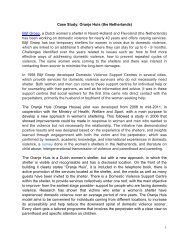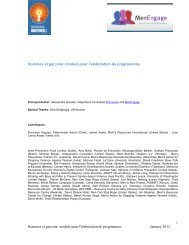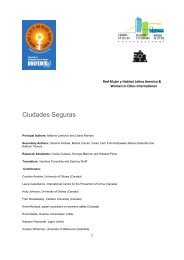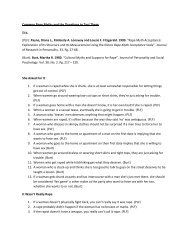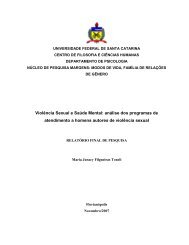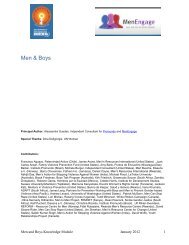Campaigns to End Violence against Women and Girls - Virtual ...
Campaigns to End Violence against Women and Girls - Virtual ...
Campaigns to End Violence against Women and Girls - Virtual ...
Create successful ePaper yourself
Turn your PDF publications into a flip-book with our unique Google optimized e-Paper software.
7.7 BASELINE ASSESSMENT<br />
WHAT IS A BASELINE ASSESSMENT?<br />
A baseline assessment provides information on the situation the campaign aims <strong>to</strong><br />
change. It provides a critical reference point for assessing changes <strong>and</strong> impact, as it<br />
establishes a basis for comparing the situation before <strong>and</strong> after an intervention, <strong>and</strong> for<br />
making inferences as <strong>to</strong> the effectiveness of the campaign. Baseline assessments<br />
should be conducted before the actual campaign intervention starts so as <strong>to</strong> serve as a<br />
benchmark for examining what change is triggered by the intervention. A baseline<br />
assessment is a crucial element in formative campaign research <strong>and</strong> planning, <strong>and</strong> in<br />
any moni<strong>to</strong>ring <strong>and</strong> evaluation framework.<br />
The type of data <strong>to</strong> be included in the baseline depends on the goals the campaign aims<br />
<strong>to</strong> achieve, the theory of change underlying the campaign, <strong>and</strong> the change indica<strong>to</strong>rs<br />
that are defined in the moni<strong>to</strong>ring <strong>and</strong> evaluation framework. Baseline information<br />
should be carried out in such a way that the same type of data can be collected after the<br />
intervention, in order <strong>to</strong> compare the results <strong>and</strong> assess the extent of change, or lack<br />
thereof. A PESTEL analysis can be useful <strong>to</strong> map legal <strong>and</strong> political external fac<strong>to</strong>rs,<br />
especially in advocacy/institutional change campaigns.<br />
Example: If the campaign goal is <strong>to</strong> ensure that police staff throughout the country<br />
receive specialized training on work with VAW survivors, then the baseline should<br />
include an assessment of existing police rules <strong>and</strong> procedures regarding VAW cases,<br />
existing training curricula <strong>and</strong> the legal framework, <strong>and</strong> police knowledge <strong>and</strong> practice<br />
regarding these rules <strong>and</strong> procedures.<br />
Good sources of information for baseline assessments include: Official statistics,<br />
existing survey results <strong>and</strong> quality research reports, journal <strong>and</strong> newspaper articles.. It<br />
may also be necessary <strong>to</strong> conduct one’s own baseline research on specific campaign<br />
issues or campaign methods <strong>and</strong> <strong>to</strong>ols, particularly if there is limited existing data <strong>and</strong><br />
information. In this case, baseline research could include a range of strategic planning<br />
exercises including formative situation analysis, stakeholder analysis, <strong>and</strong> resource<br />
mapping. See Campaign planning for more guidance.<br />
BASELINE SURVEYS<br />
<strong>Campaigns</strong> often target large audiences, yet most campaigns will not comm<strong>and</strong><br />
sufficient financial <strong>and</strong> human resources <strong>to</strong> undertake a population-wide survey. A<br />
baseline thus needs ideally <strong>to</strong> capture data from a statistically representative sample of<br />
the target population. To do this, it is common <strong>to</strong> apply <strong>to</strong>ols used in development<br />
programmes, such as participa<strong>to</strong>ry assessments <strong>and</strong> KAP surveys, which rely on<br />
qualitative exploration with relatively small samples.<br />
Baseline surveys such as KAP surveys can be conducted in behaviour-change<br />
campaigns <strong>to</strong> assess Knowledge, Attitudes <strong>and</strong> Practices of the target audience with<br />
respect <strong>to</strong> the campaign issue. Extensively applied in public health programmes, e.g. in<br />
HIV/AIDS-related projects, KAP surveys combine qualitative information <strong>and</strong> quantitative<br />
data obtained from relatively small samples of the target population, e.g. through focus<br />
group discussions <strong>and</strong> questionnaire-based surveys.<br />
One challenge <strong>to</strong> bear in mind when conducting surveys related <strong>to</strong> VAW is that the issue<br />
is most often an under-reported <strong>and</strong> sensitive one, <strong>and</strong> many people may therefore<br />
274<br />
<strong>Campaigns</strong> December 2011



